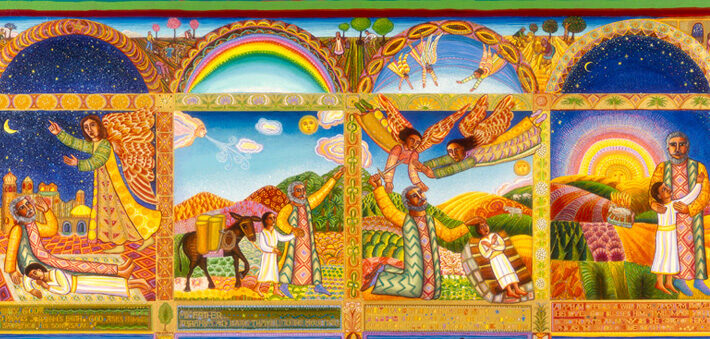Commentary on Psalm 89:1-4, 15-18
At the heart of Psalm 89 is the shattering of the world, to which the psalm gives articulation and to whose unraveling the entire Psalter is devoted.
And the proper interpretation of Psalm 89, arguably of the entire Psalter, and even of the Christian hope in Christ Jesus rests, in part, on the full appreciation of this trauma: The faithful and mighty God (89:1-2) who made an eternal covenant with David (89:3-4) has renounced that covenant (89:39) and hidden himself (89:46).
God and King
Psalm 89 celebrates God’s love and faithfulness (89:1-2) and equally God’s election of David, the divine promise to establish his kingdom forever (89:3-4), and these two constitute the foundational facts on which the cosmos, according to our psalm, rests. For God “rules the raging of the sea” (89:9, NRSV) and “crushed Rahab like a carcass” (89:10) to ensure that forces of chaos and death do not again return to earth; and David shares in God’s cosmic authority over evil, which God gave him, saying: “I will set his hand on the sea / and his right hand on the rivers” (89:25).
The embedded diarchy of God and David, anchored in the love and faithfulness of the one God, ensures the endurance of David’s throne and, what’s more, the flourishing of the world. Because the God who made a covenant with David loves and is faithful, David’s throne stands secure forever. And because God and David reign together in might, all is right in the world.
The Shattering of the World
The events of 587 BCE shatter the world in which God and king are in control. In 587, as is well known, the Babylonians destroyed the House of God, put a violent end to the House of David, and devastated the people. The final third of Psalm 89 (89:38-51) laments this catastrophe and raises pointed questions concerning the theological and political foundations on which the world supposedly rests.
Psalm 89:38-51, at first brush, appears to focus on the relationship between God and David: “But now you have spurned and rejected him; / you are full of wrath against your anointed” (89:38, see also 89:39-45, 49-51). But we misread the psalm if we focus only on the God-David connection. David is a cipher for the orderliness of historical existence in toto and the earthly representative of God’s cosmic sovereignty.
God’s rejection of David points to the divine betrayal of creation, and the demise of David’s kingship suggests a like end to God’s kingship. In short, the experience of death and chaos — in the case of Psalm 89, of 587 and afterward — places under question the validity of the theological claim that God loves, is faithful, and rules over creation in power, for the final authority. Hence, the ultimate responsibility, for life and order rests with God.
How long, O LORD? Will you hide yourself forever?
How long will your wrath burn like fire? (89:46)
After Trauma
The psalm provides no easy answer to the difficult questions it raises. Rather, the trauma of 587 is allowed to rupture the very structure of the psalm. Consider the chasm that separates verse 37 from verse 38. Furthermore, as the conclusion of Book III of the Psalter, Psalm 89 also represents a rupture in the Book of Psalms around which the entire Psalter turns. That is to say, the shattering of the world at the heart of Psalm 89 is the trauma at the core of the Psalter itself.
Psalm 89 presents the trauma and, in response, offers no resolution. More fittingly, it raises the darkest of theological questions. From within the tragedy of exile, the psalmist cannot see God and complains: “Will you hide yourself forever?” (89:46a). And, in conclusion, he seems to give himself over to despair: “Who can escape the power of Sheol?” (89:51b). Psalm 89 does not provide an answer to its own questions. Rather, it recognizes the reality and power of trauma and remains, as so many victims of traumatic events are, dumb, mute, and utterly confounded.
Now, though no immediate resolution to the experience of trauma can be found in Psalm 89, that is not to say that there is no engagement or effort to respond. No, the entire Psalter, at some level, is an effort to respond to the theological crisis of 587.
As has been noted by many commentators, Books I-III of the Psalter (Psalms 1-89) can be read as recounting the rise and fall of the Davidic monarchy. In brief, Psalm 2 represents the divine adoption of David’s household and the beginning of the Davidic monarchy as God’s chosen representative on earth. Many subsequent psalms, by means of their superscriptions, reference events in David’s life as recounted in Samuel. For example, Psalm 18 refers to David’s escape from Saul’s murderous intent, and Psalm 51 to David’s adultery with Bathsheba. Palm 72, which concludes Book II, marks perhaps David’s dying prayer for Solomon. Even after the death of David, a son of David continues to occupy the throne.
Now, as we discussed, Psalm 89 references the end of the Davidic monarchy and, simultaneously, raises a theological question: Does the end of the Davidic kingship signify the end of the kingship of God, who guaranteed that David will be king forever? God bound divine kingship to human kingship in an eternal covenant. So does God shares in the shameful fate of the human king?
Book IV-V (Psalm 90-150) provides a complex response to the theological crisis raised by Psalm 89. The response, in broad strokes, is twofold. One, Books IV-V emphasize that God was, is, and will be king forever. This response can be seen most clearly in Psalms 93-100, the “Yhwh is king” psalms, so-called because of the repeated claim: “Yhwh is king” (93:1; 96:10; 97:1; 99:1; cf. 95:3; 98:6; 99:4). These psalms claim that, even after the demise of the Davidic monarchy, God remains king.
Two, David is not again referred to as “king” in Books IV-V. The implication is that David’s kingship can and did come to an end in 587 independent of God’s kingship. David, it should be noted, does reappear in Books IV-V, beginning in Psalm 101, right after the “Yhwh is king” psalms (Psalms 101, 103, 108-110, 138-145). He appears, however, not as king, but as cantor. He no longer leads the army into battle but rather the faithful throng in praise of God the King. Thus, David declares, “I will sing of loyalty and justice; / to you, O LORD, I will sing,” (101:1) and, “I will exalt you, my God, the King” (145:1a, my translation).
In sum, the trauma of Psalm 89, which is the trauma of the Psalter, requires the deployment of the resources of all the psalms to resolve. This speaks to the seriousness of trauma, especially of the trauma of 587, which shook the core of Israel’s sense of self, history, and God. And the seriousness with which the psalmic tradition handles trauma advises us from looking for easy answers to life’s deep problems and encourages, rather, patience and humility. It advises hope in God, who is, was, and will be king.
Christ the King
For Christian readers of the Psalm, it should be noted that the New Testament writers found a related but distinct resolution to the problem Psalm 89 raises, the link between divine and human kingship and its subsequent rupture. In conversation with other early Jewish traditions, the New Testament writers proclaim, on various occasions, that Christ Jesus is the Davidic king (see, for example, Acts 2:29-36; Rom 1:3). The Davidic king who was elected and rejected endures in Christ Jesus, who himself was rejected unto death to rise on the third day. Thus, the church too can sing:
I will sing of your steadfast love, O LORD, forever;
With my mouth I will proclaim your faithfulness to all generations. (89:1)


July 2, 2017